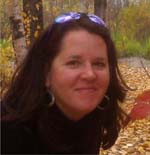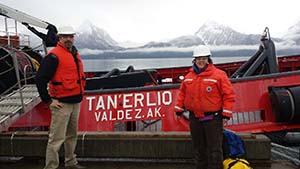By LISA MATLOCK
Outreach Coordinator

In 2013, Alaska and Alaskans lost Prince William Sound advocate, Stan Stephens, a constant voice for safe oil transportation in Alaska. Also this past year, “Homer”, the last surviving sea otter rescued from the Exxon Valdez oil spill in 1989, died at her aquarium home. Firsthand Exxon Valdez oil spill memories are fading. And who wants to dwell on such a terrible event?
The tragic and emotionally wrenching life-changing personal experiences of those who responded to the Exxon Valdez oil spill helped motivate a generation of council members and partners to prevent another major oil shipping disaster in the state. Oil spill prevention measures, such as double hulled tankers and dual escort tug systems for shipping, oil spill response drills and Geographic Response Strategies that take into account local knowledge when planning for the protection of sensitive areas, safe marine terminal operations, and long term environmental monitoring, all contribute to minimizing complacency, and the potential for another major oil spill.
But memories of an event, even such a disastrous one, only last so long.
The council remains committed to working with industry and regulatory agencies to safely transport oil through Alaskan waters. Oil spill prevention measures at work in Prince William Sound have extended to other parts of the country and world, helping to improve the safety of oil shipping globally. By remembering what happened during the Exxon Valdez oil spill 25 years later, we hope to motivate Alaskans to continue the unending hard work of oil spill prevention. Oil spill prevention measures are what future generations of people and the marine environment need to avoid the destructive and expensive experience of another major spill.

The following events are planned to commemorate the spill this year, to honor those who faced it, and to remind those who were not there why the council and others interested in the fate of our region strive to keep it from ever happening again.
- Public Presentations: Throughout the month of March, the council is offering public presentations about the Exxon Valdez oil spill and the good that has come out of it and concerns for the future over 25 years to museums and libraries in the region. Dates so far include:
- March 4 at the Valdez Museum
- March 11 at the U.S. Forest Service in Cordova, in partnership with the Prince William Sound Science Center
- March 24 at the Loussac Library in Anchorage
We are working with several other communities, including Seward, Kodiak, and Homer. More information will be posted on our website as it becomes available. If you are interested in hosting a presentation in your community, contact: lisa.matlock@pwsrcac.org. UPDATED SCHEDULE OF EVENTS
- Project Jukebox: The council is working to preserve the voices of twenty people impacted by the oil spill online through the University of Alaska Fairbanks Oral History Program’s Project Jukebox: www.bit.ly/ProjectJukebox.
- School Programs: The council recently revised its K-12 Oil Spill Curricula to both meet new standards and help students who may have never experienced a technological disaster to understand the importance of continued oil spill prevention. Teachers who would like to request a live classroom program using the new curricula or a link to its activities, please email: lisa.matlock@pwsrcac.org.